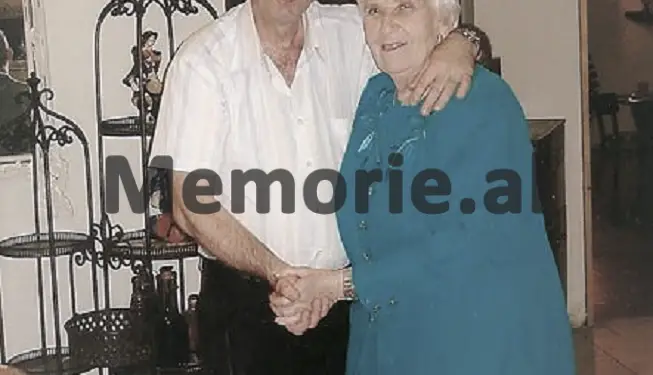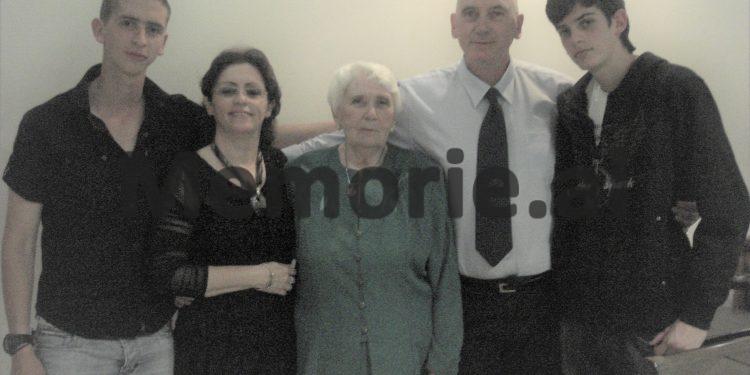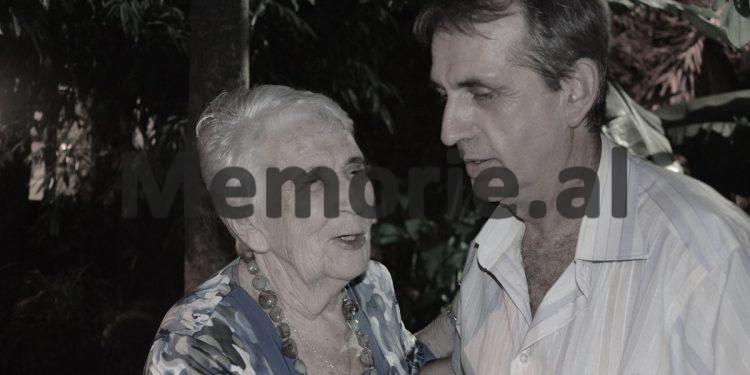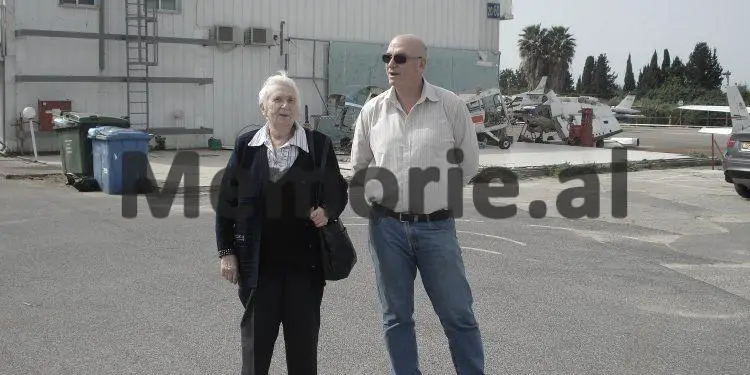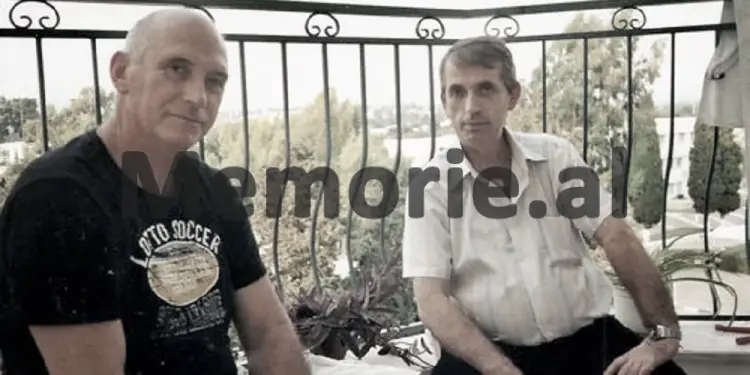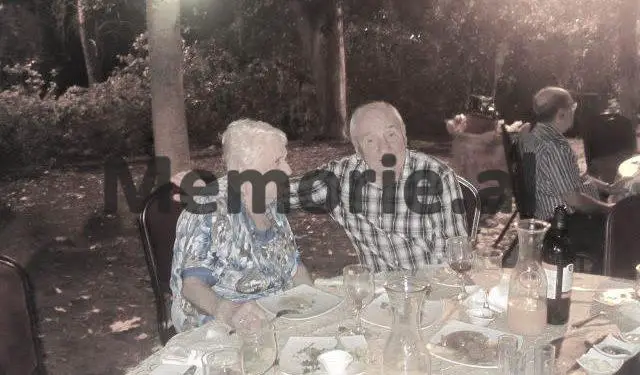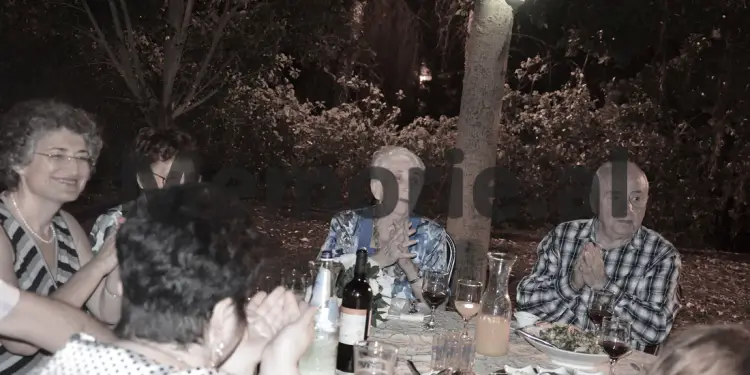By Tasia Batkina Pine
Part fifteen
Memorie.al/ publishes the unknown story of the Russian Taisa Batkina (Pine), originally from Tula, Russia, the third child of a very poor rural family, who was left an orphan at a very young age, after her father lost her life while working in one of the coal galleries on the outskirts of Tula, where he worked as a miner (shortly after escaping arrest, accused of “supporting the enemies of the people”) and she grew up with difficulty great economic, as their city continued to be under the bombardment of German forces, which had reached as far as near Kursk. Taisa graduated from the Faculty of Chemistry, near the ‘Lomonosov’ University of Moscow, where she met and married the Albanian student, Gaqo Pisha, originally from the city of Korça, who at that time was studying at the Faculty of Philosophy in Moscow and both together in 1957, they returned to Albania, together with their newborn son, Sasha, and began life in the city of Tirana, where Taisa was appointed as a professor of Chemistry at the State University of Tirana, while Gaqo, in the chair of Marxism- where they worked until 1976, when the State Security arrested Taisa Batkina on fabricated charges, accusing her of being a “Soviet KGB agent” and sentencing her to 16 years in political prison, which she suffered in the “Women’s Prison” in the city “Stalin”, from where she was released in 1986, while her husband, Gaqo Pisha, had died in 1983, from a serious illness. The tragic story of Taisa Batkina (Pine), in the inhuman camps and prisons of Enver Hoxha’s communist regime, where she spent a decade of her life, along with many compatriots from the former Soviet Union, or other Eastern European countries, comes through her memories, published in a book entitled “We hoped and survived”, memories which, her son, Aleksandër Pisha, kindly offered her for publication, in Memorie.al
We hoped and survived
I dedicate it to the bright memory of my husband, GAQO PISHA
This is a book of memories. In it I want to tell about my life and that of my friends, Soviet women, who tried prison for several years just because they got the courage and got married and linked their fate with that of Albanian students. The prison was part of the great GULAG in the small Balkan country, Albania, where for many years the bloody communist regime of Enver Hoxha ruled, who was a loyal student of Stalin and a follower of his cause.
Through this book I would like everyone to learn about the inhuman trials we experienced and the horrible years we spent in Albanian prisons, just because we… fell in love! And let no one ever forget what totalitarianism, despotism is and what the consequences of this system are.
Continued from the previous issue
On the Radio we heard the decree of our release
On the radio they issued the decree according to which, along with others, all women sentenced to up to 20 years were released. Our happiness and excitement were unparalleled. We were all free! Finally… what happiness… we would be free! In the soul we felt happy, relieved! Are you really going to get out of here in five days, get out of this disgusting cage? My whole life in Albania was accompanied by a constant narrowing of space; at first we were not allowed to leave Albania, then they took us to the small town of Berat from where I could go elsewhere only with the permission of the organs and finally, the barbed wire fence camp. Everyone was released from our corps of political prisoners, except for one woman from Durrës, named Liri. She was sentenced to 25 years for abuse of colossal amounts, 8 million ALL. Then they added the article “on agitation and propaganda”. Ordinary murderers and abusers with a sentence of more than 20 years remained in prison.
All days, until the day of the amnesty, passed with preparation. We all gathered the most necessary things, some of the house clothes that we had stored. Our property was confiscated and we did not know if there was anything left to wear, or her. I took nothing from the camp clothes, threw away all the junk, scattered all the scum that had accumulated during my years in prison. I was afraid they would take my letters when I went out, so I burned most of them. Wrong! Nobody wanted to know about the letters! The last few days were barely moving. Finally came January 12, 1986. After lunch we were given the documents, the money. I received very little, only 200 All. I never knew how to save and save money. That night they took us to sleep in the corps of ordinary people and in the tone remained those that did not catch the release. It was a very cold, frosty night. No one slept. Cheerful shouts, songs were heard from all the rooms. Before dawn, the guards came, checked us, and took us out into the yard in front of the gate. We put our belongings aside and waited for breakfast, buses, freedom. We lit a big fire in the kitchen to keep warm. This time we did not spare the wood, we did not spare it, there was no need.
Finally came the morning. We saw the buses approaching the camp but surprisingly they were still not starting to release us. After a while we were told that the bosses were waiting from Tirana and the bosses were always late. When the bosses came, they organized a rally where we thanked the party and the government for our release, and expressed the satisfaction that we, finally, got better. When the chiefs’ cars approached the camp, the large Iron Gate opened the shutters, the cars entered the yard, turned. We had never seen that gate open like that. At that moment I really felt that I was free. My soul was filled with joy, with a feeling of happiness I could not describe. Everything was over; we had survived, endured, escaped! Now, comparing the happy moments I spent in life with what I experienced when I was released, I can say that this was another feeling, incomparable to others. I cannot call it greater than, say, the joy of childbirth. No, not bigger, but… next. It seems to me it was… the feeling of flying! We felt sorry for those who remained in the camp, their teary faces appearing at the closed canteen windows. But that for us was the last step, we would be free. Of course, we understood that neither rehabilitation nor reconsideration of our cases could be discussed. Enver Hoxha’s collaborators were still in power, accomplices in all his deeds. There was no question of exposing the regime.
One of the purposes of this amnesty was the release of foreign women, and the conditions were chosen in such a way that the amnesty would cover us all. In fact, with us, almost the entire women’s prison was released (only 10 people remained inside). Immediately after the rally, buses approached the gate; we all left… who in the south, who in the north, who in Tirana. We traveled, we looked out the window. Nothing had changed in 10 years; the same bad roads, poor villages… But later we saw that there were some changes: everywhere, in the fields, along the road sprouted like mushrooms in concrete bunkers. It was a not-so-pleasant sensation. We later learned that by order of Mehmet Shehu, several lines of protection from concrete bunkers had been erected throughout the country. You saw them everywhere, on the beach, in the fields, in the cemetery. According to some data, in Albania there were 20, or 30 thousand. Their construction was another very heavy burden for the weak economy of the country, and brought further impoverishment of the people. In the last meeting we agreed with Sasha, that we would meet in Tirana. It made no sense for him to come to the camp because we had to be taken to where we had been arrested. The bus stopped us in the center of Tirana. With our bags, sewn with all kinds of rags, with the same prison pants, brown, we aroused the curiosity of every passerby. We did not see anyone waiting for us.
A little further on was the taxi stand. There were no cheap cars, they had to wait. Suddenly Sasha got on the bike. They had waited for me with Costa, they had roamed the city by bicycle, because no one knew which way we would come. Finally a taxi came; Vola and I loaded our bags and headed for my house. Vola had nowhere to go, everyone had denied her, and in her place was another housewife. Julia, Costa’s fiancée, was waiting for me. She had prepared everything for our arrival. Then came Sasha and Costa. We took a good shower, cleaned up the prison and street dust, for the first time in 10 years, ate delicious lunch and lay down to rest. We were free, we were at home! The most horrible period of our lives was over!
Upon release
I’m backing home! Or rather, in the ruins of my house. Here was not the man so dear, for whose sake I left the country, my relatives and came to Albania. Always and in everything I had felt his help, shoulder and support. But he could not save me from the terrible risk of persecution, from this risk it was impossible to escape. Only Costa lived in the house. Sasha had another house. The boys told me how they had lived without me, how difficult it had been. Costa spent two years with his ailing father when Sasha was a soldier. With my husband’s small pension, they bought expensive medicine, without which Gaqoja could not do it, they also helped me a little, and sent Sasha some money. In the Albanian army there was no salary for compulsory service, and the food was very bad. The boys also told me something about Gaqo’s illness. I first heard how seriously Costa fell ill while serving in the military; he was returning home from the ward when he was suddenly struck by a severe appendicitis crisis. He was hospitalized, but I do not know why he was not operated on immediately. In the morning, when they operated on him, the condition had turned into peritonitis. They rescued him with great difficulty, but the wound was not closing for a long time and he stayed in the military hospital for several months. Two days after my return from prison came the brother-in-law, the husband’s older brother, a man of very bad luck. He had spent 17 years in prison for refusing to become a Security spy.
The next day we went to the cemetery together. Early in the morning I went to buy a bunch of flowers but the only flower shop in town was closed. Not far from the house were the nursery and some greenhouses. There used to be a lot of flowers there, but now you can only see some here and there. At the end of a greenhouse I saw a woman making a bouquet of white lilies. I begged him to sell it to me. “What do you say?” She replied. “These are just for Comrade Enver’s grave, we bring fresh flowers there every day, and we do not sell them to others… there are no flowers…”! I wanted to scream, to revolt. But I just wanted to. The fear inside me took its toll, I turned and walked away. Flowers were given to me by the neighbors, who kept them in the yard. We went to the cemetery. I cried for a few minutes near the simple grave, in the farthest corner of the cemetery. Later, before leaving Albania, we reburied my husband, placed him next to his mother and brother, and made a good monument to him. At home I found the same furniture; furniture obsolete and torn over 10 years, but in bed there was no mattress, in the closet almost no clothes, no sheets or towels, only unwashed, loose blankets. The confiscation of property, 10 years of almost poor existence of my family, the lack of a wife’s hand, had made the house in that condition. It took months of hard work, to fix life a little, to give the apartment the warmth of a family hearth. My library was preserved, although sparse after confiscation. Books were my weakness.
Until 1966, when there was a library called “Soviet Book” and then “International Book”, we created a large library with artistic literature and specialties Chemistry and Philosophy. All this wealth we had to forgive, distribute or just abandon, when we could break away from Albania and go to the Soviet Union in 1990. Our small two-room apartment had long been eyeing the neighborhood council. , while one room of the apartment belonged to another, because we were deprived of all rights, we had no right to living space, the goods were confiscated, we did not enjoy civil rights. But here we had to live further. The amnesty only gave us freedom, but it was not rehabilitation. We continued to be called “enemies of the people” whom the state had shown mercy and forgiveness. Although Enver Hoxha was no longer alive, his case remained alive. A magnificent building was erected in Tirana, where the museum of Enver would be, and in the central square preparations were made to lay his tall statue. Everything in the place was run by Enver’s wife. The State Security had received instructions to help us, to fix it in some way. There is no doubt that most of the people in these bodies understood that we were absolutely not to blame, but this could not be talked about, because “the Albanian Security organs could not be wrong”! We were released from prison, but rehabilitation was still a long way off. And help for us was necessary; many had no shelter, families were sabotaged, broken, some of my friends’ husbands could not stand the pressure from the authorities and had created new families, children were forced to deny their parents. In a way they helped us with housing, preparing pension documents or arranging for work.
I was called to the Executive Committee, with a gesture of “pompous generosity”, they returned the 8 square meters of the room they had taken from my apartment and told me to return to the work I had been before I was arrested, to the Wood Factory. Until retirement I had to work another year and a half. When I went to the Kombinat cadre branch, I was told that, as a former convict, I had no right to work as an engineer because they could not entrust me with such a responsible task. They took me to the dyeing department, to the brigade that worked with the varnishing machine. Prior to my arrest I had initially worked in the paper mill, which had just started working. I was in charge of the lab that was responsible for the quality of the production. Then I was transferred to the technology bureau where, as I wrote above, I dealt with all the problems that arose in the combine and had to do with chemistry, in all the factories and departments of the plant. It was clear that they knew me well in the combine, they felt sorry for me, but they could not help me.
Working in the ward was very hard for me. The process was not mechanized, heavy sawdust pieces of furniture had to be manually inserted into the machine. I did this job with great difficulty, and the salary was very small. In addition, I came to the position of the poor, toiled women of the brigade. The payment was collective and because of me, they received less. I continued this work for several months. My friends, with whom I had worked before my arrest, including the chief engineer and the chief of staff, wanted to help me, which was difficult and dangerous. They finally found an opportunity. They persuaded the head of the synthetic glue ward, which needed an experienced chemist, to go to the factory director and ask him to take me to her ward. The director, a former senior military man on release, being unprofessional, had confidence in the production managers and immediately accepted. In the organics I was a worker, but I did the work of a chemist. I took a year and a half with this job, until I reached retirement age. For us, who had been sentenced to prison, the pension was minimal, so small that it was very difficult to live with it. To get a little more, I had to work another year and a half. Those of the combine accepted, but someone reported to the Security organs, from where the immediate reaction came: the directorate was blamed for the support of the enemy and I was urgently retired.
After the release, what burdened me the most was the attitude of the people? They were afraid to approach me, to greet me, to talk to me, everyone: relatives, relatives, work colleagues, acquaintances. I do not blame them; their behavior was conditioned by the fear with which these people had lived for many years, and which had entered their marrow. When Vola and I came home by taxi after our release from prison, an unknown man was dealing with something near our stairs. He quit his job and helped us raise our belongings to the second floor. I later learned it was our new neighbor. Surely, he did not know who we were so he helped us. By the next day, like all other mammals, he would no longer greet us. When I was released from prison for the first time in the factory where I once worked, some simple women, who understood everything very well, threw themselves on my neck crying. It was very touching and a lot of fun. Later, a few months later, they told me that they had embraced me, driven by the first feeling and momentum, but then they trembled, waiting to be warned that they were so warm to me. I had a lot of uncomfortable strokes. At that time I was working in the dyeing department. I was approached by a former colleague of mine from university, a good man. After we talked, he asked me to show him the furniture because he wanted to buy it. He suddenly changed his face, remembered that I was a worker, and hurried away. Another time I was waiting for the bus. At the station I caught sight of a former lab technician of mine, we had worked together for many years at university, and we had had an excellent team and very good company. I leaned towards her to hug her, forgetting who I was. I noticed fear on her face, and immediately pulled back… very heavy!
One day I went to university to get a pension document. I sat in the lobby and waited for the chief of staff. Suddenly a former student of mine came in, then a colleague, a good friend. He spotted me, froze in place, then made a few turns around the lobby, not knowing how to behave, approach, greet, or remove as if he had not seen me. He chose the latter, climbed the stairs, and made his way to the chair. Many years later after many things had changed, we were going to the Soviet Union, and he came to greet us and cried with tears of deep sorrow. He cried because of his helplessness at that time, out of anger for the order that deprived people of so many years of normal life that tortured them so long with fear. I have never held them and I do not hold anyone’s grudge because I know where I have lived. But… it hurt me! The only ones who supported me in those difficult days were Costa’s fiancée’s people. Her parents had large families and went out a lot with each other. Everyone came, helped me, and supported me. This was very valuable to me at the time and I will never forget it. I also had joys, great joys. Costa got married, we got married, then Juna was born, my dear niece, a real little ball, warm, blue-eyed. How I had dreamed of a maid! What happiness it was to hold her in my arms, to wash her, to feed her, to raise her! Then Sasha got married, the boy was born with black, shiny eyes… another baby, my dear nephew! We named him after his grandfather, Gjergj. /Memorie.al




